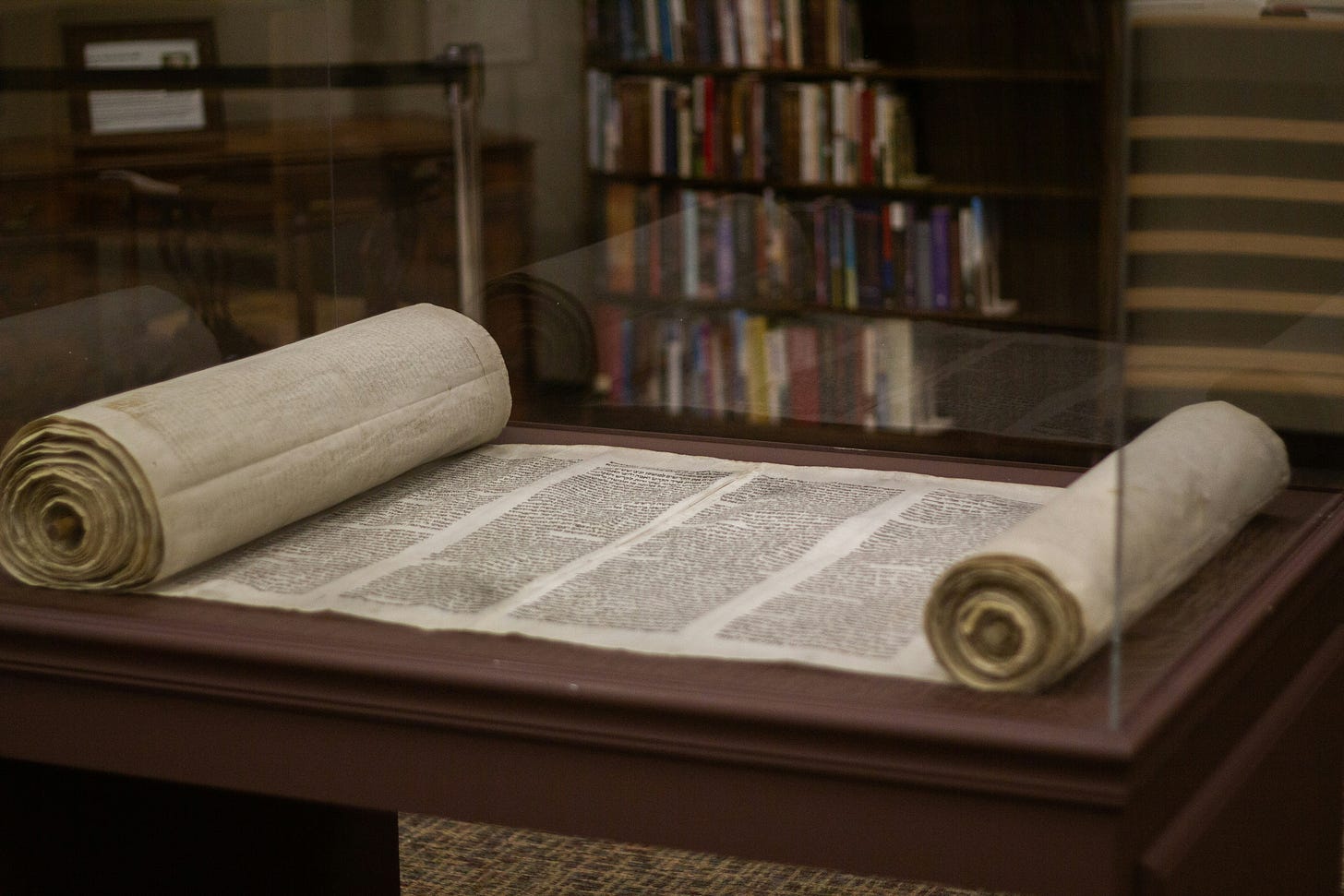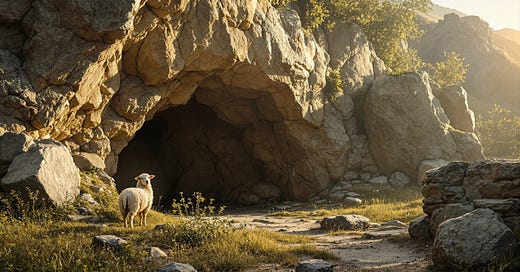I ran into Walmart a couple of weeks ago and the front aisles welcomed me with row after row of colorful baskets, plastic eggs, and chocolate bunnies. “What does all this have to do with Jesus’ death, burial, and resurrection?” I asked myself. Not a lot.
Easter season comes in a mixed bag of pagan celebrations related to the spring equinox and Christian celebrations related to the resurrection of Jesus Christ.
Now, I’m all about having Easter fun and using the symbols of spring celebrations to share the Gospel (you can download my Easter Activity Devotionals here). But this year’s absence of lambs in Easter fanfare got me wondering, “Why am I so irritated that there are no cute little lambs in the Walmart aisle?”
Because, to me, Easter is all about the Lamb of God.
The Apostle John recorded John the Baptist declaring out in the wilderness, “Behold the Lamb of God that takes away the sin of the world” as Jesus entered the scene (John 1:29).
But what does it mean that Jesus is the Lamb of God? Why such as strange statement?
Following the Image of the “Lamb of God” in Scripture
Genesis
Genesis 3:21 The Lord God made garments of skin for Adam and his wife and clothed them.
In the first pages of the Bible, we find the need for the shedding of blood (an animal) to cover the consequence of sin (fear/shame/nakedness). While it does not state that this animal was a lamb, the shedding of blood to cover sin was demonstrated in this initial act by God.
Later in the Biblical account, the Israelites are enslaved in Egypt and call out to God to help them. He sent Moses to tell Pharaoh to let God’s people go, but Pharaoh said no—over and over. So God sent plagues, ten to be exact. The last plague was the death of every firstborn male (human and animal), but God instructed the Israelites to perform a ritual including sacrificing a lamb to keep them from this death curse.
Exodus
Exodus 12:21–23, 29–32
21 Then Moses summoned all the elders of Israel and said to them, “Go at once and select the animals for your families and slaughter the Passover lamb. 22 Take a bunch of hyssop*, dip it into the blood in the basin and put some of the blood on the top and on both sides of the doorframe. None of you shall go out of the door of your house until morning. 23 When the Lord goes through the land to strike down the Egyptians, he will see the blood on the top and sides of the doorframe and will pass over that doorway, and he will not permit the destroyer to enter your houses and strike you down.
29 At midnight the Lord struck down all the firstborn in Egypt, from the firstborn of Pharaoh, who sat on the throne, to the firstborn of the prisoner, who was in the dungeon, and the firstborn of all the livestock as well. 30 Pharaoh and all his officials and all the Egyptians got up during the night, and there was loud wailing in Egypt, for there was not a house without someone dead.
31 During the night Pharaoh summoned Moses and Aaron and said, “Up! Leave my people, you and the Israelites! Go, worship the Lord as you have requested. 32 Take your flocks and herds, as you have said, and go. And also bless me.”

The Law (Leviticus)
The book of Leviticus outlines the sacrificial system. Through these described rituals, we see the killing of a spotless (“innocent”) lamb taking guilt away from the one offering the sacrifice.
Examples include a female lamb without blemish being sacrificed for sin offerings (Lev 4), a male lamb used for guilt offerings (Lev 5), male of female lambs without blemish used for peace offerings (Lev 7), and a male lamb without blemish sacrificed during the Passover festival (Lev 23).
Isaiah
700 years before Jesus, the prophet Isaiah wrote words the described Jesus’ sacrifice in impossible detail (because it was revealed to him by God).
Isaiah 53:7–9
7 He was oppressed and afflicted,
yet he did not open his mouth;
he was led like a lamb to the slaughter,
and as a sheep before its shearers is silent,
so he did not open his mouth.
8 By oppression and judgment he was taken away.
Yet who of his generation protested?
For he was cut off from the land of the living;
for the transgression of my people he was punished.
9 He was assigned a grave with the wicked,
and with the rich in his death,
though he had done no violence,
nor was any deceit in his mouth.
New Testament
Biblical writers after Jesus’ coming also allude to Jesus being the Lamb of God (that John clearly states in John 1:29).
Some other examples include:
1 Peter 1:19: "But you were redeemed, not with perishable things like silver or gold, but with the precious blood of Christ, like that of a lamb without blemish or spot."
Revelation 5:12: "Worthy is the Lamb, who was slain, to receive power and wealth and wisdom and strength and honor and glory and praise!"
Revelation 13:8: "And all who dwell on earth will worship him, every one whose name is not written in the book of life, which has been slain."
Costly Sacrifice
Old Testament sacrifices were costly. Livestock was like the ancient version of the stock exchange, as animals were part of how people invested their resources and the more livestock you owned, the wealthier you were.
It is fitting that God required a blood sacrifice to pay the penalty for a person’s sin (the wages of sin is death, Romans 6:23). But also that the sacrifice would be costly to those offering it.
Now we do not need to offer costly blood sacrifices because Jesus paid for our sin on the cross—but He still calls us to sacrifice as we follow Him.
And sacrifices are often costly.
Reflect
Rest silently before the Lord for a few moments.
Ask the Lord: “Is there anything You want me to sacrifice to honor You and follow You more closely?”
It might be to wake up earlier for time with Him before you start your day (sacrifice of sleep) or becoming more generous with your resources. Or it might be something else you quit doing or start doing to honor Him. What might worshipping the Lord in a sacrifical way look like for you?
(Example: Years ago when I was a newer believer, I prayed a similar prayer as above and afterward I knew God was leading me to quit smoking to honor Him with my body. It was a very hard sacrifice, but obeying the Spirit’s leading drew me closer in to Him—not to mention saved my lung health!)
Pray as you are led or you can pray this prayer below:
Father, God, I worship You. Thank You for the costly sacrifice of Jesus to pay the penalty of my sin on the cross. Lord, how might I live more faithfully in following You? Is there anything that You desire me to sacrifice to honor You? Please led me, Lord. You are my treasure. In Jesus’ name, amen.
On the Well Soul Life podcast this week
SERIES: Women in the Old Testament Story
Who are some of the women in the Old Testament story? How do their lives contribute to the story of God? What can we learn from them for our life of faith today?
Miriam the Prophetess
Once freed from slavery in Egypt, the people rejoiced! No longer would they be oppressed by brutal task maters. No longer would their children be born only to be more labor horses for the powerful.
And the response of Moses, Miriam, and the people of God—was worship. This is the place in the story of the Old Testament where we mediate on scripture this week.
Select verses from Exodus 15 and Micah 6:4
Exodus 15:1–6
Then Moses and the Israelites sang this song to the Lord:
“I will sing to the Lord,
for he is highly exalted.
Both horse and driver
he has hurled into the sea.2 “The Lord is my strength and my defense;
he has become my salvation.
He is my God, and I will praise him,
my father’s God, and I will exalt him.
3 The Lord is a warrior;
the Lord is his name.
4 Pharaoh’s chariots and his army
he has hurled into the sea.
The best of Pharaoh’s officers
are drowned in the Red Sea.
5 The deep waters have covered them;
they sank to the depths like a stone.
6 Your right hand, Lord,
was majestic in power.
Your right hand, Lord,
shattered the enemy.V.11-13
11 Who among the gods
is like you, Lord?
Who is like you—
majestic in holiness,
awesome in glory,
working wonders?12 “You stretch out your right hand,
and the earth swallows your enemies.
13 In your unfailing love you will lead
the people you have redeemed.
In your strength you will guide them
to your holy dwelling.Vv 19-21
19 When Pharaoh’s horses, chariots and horsemen went into the sea, the Lord brought the waters of the sea back over them, but the Israelites walked through the sea on dry ground. 20 Then Miriam the prophet, Aaron’s sister, took a timbrel in her hand, and all the women followed her, with timbrels and dancing. 21 Miriam sang to them:
“Sing to the Lord,
for he is highly exalted.
Both horse and driver
he has hurled into the sea.”Micah 6:4
I brought you up out of Egypt
and redeemed you from the land of slavery.
I sent Moses to lead you,
also Aaron and Miriam.
What did you notice from these verses? Dwell on this for a moment.
Miriam, the prophetess, is a key figure in the Exodus story. She helped save her brother from infanticide, helped connect Moses with his own mother to care for him, led the women in worship after the Exodus, and helped lead during the wilderness wanderings, according to Micah 6:4.
Now, no leader is perfect (Miriam also gets in trouble at one point), but what I want us to notice is that God used a woman as a leader in the Exodus.
Friend, there is always a place for women (and men) to use their gifts to serve the Lord.
Reflect:
What are your gifts?
Are you holding back serving God with your gifting in any way? If so, what is holding you back? Pray about this.
Pray as you are led or you can pray this prayer below:
Father, God, thank You for gifting each person in unique ways to serve You in this generation. God, please help me to see how I am gifted and the opportunities you want me to step into to serve you. And when I feel hindered, please show me exactly why and help me to step forward in faith. In Jesus’ name, amen.
Listen to this week’s devotional podcast.
Support the Well Soul by inviting a friend.
As always, I’m grateful if you choose to subscribe, forward, or share. Want to support my work but can’t become a supporting subscriber? Buy me a coffee








